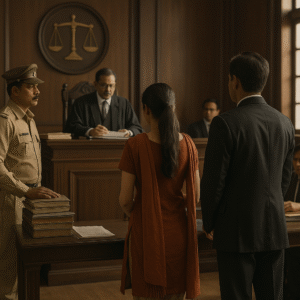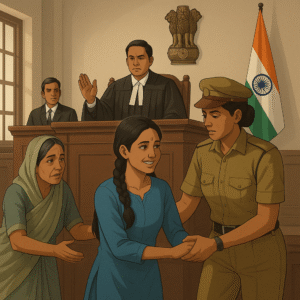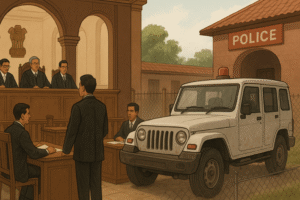Simplified Explanation of the Judgment
In a significant ruling, the Patna High Court set aside a Single Judge’s direction that had ordered district-level administrative authorities to assist in the execution of a civil court decree. The Court emphasized that the Code of Civil Procedure (CPC) provides a complete legal mechanism for enforcing civil court orders, and such matters should not be addressed through writ petitions under Article 226 of the Constitution.
The case arose from a writ petition filed by a private individual (the respondent) who had earlier obtained decrees in two title suits—Title Suit No. 41 of 1977 and Title Suit No. 116 of 1978. The learned Single Judge, in C.W.J.C. No.19103 of 2010, had directed the State authorities, including the District Magistrate and Superintendent of Police of Nalanda, to provide administrative support to enforce the decree.
The State of Bihar, through the District Magistrate and other officials, filed a Letters Patent Appeal (LPA) against this order. Their contention was that the learned Single Judge had bypassed the established mechanism under the CPC for decree execution and instead issued a direction that was both extraordinary and inappropriate under writ jurisdiction.
The Division Bench, consisting of Hon’ble Mr. Justice Jyoti Saran and Hon’ble Mr. Justice Partha Sarthy, upheld the State’s argument. The Bench referred to the landmark Supreme Court case Ghan Shyam Das Gupta & Anr. v. Anant Kumar Sinha & Ors., AIR 1991 SC 2251. In that case, the Supreme Court had observed that writ jurisdiction should not be used to bypass the execution procedures already laid down in Order XXI of the CPC.
The High Court noted that the CPC provides a robust and comprehensive framework for decree execution. It includes remedies not only for decree-holders but also for judgment-debtors and third-party objectors. If the provisions of the CPC are insufficient in an exceptional case, the appropriate course is to file a regular civil suit—not a writ petition.
The Division Bench concluded that the learned Single Judge should have refrained from entertaining the writ petition, given the availability of a specific alternative remedy under the CPC. The judgment and order in the writ case were therefore set aside, with liberty granted to the original petitioner to explore appropriate civil remedies as per law.
Significance or Implication of the Judgment
This judgment is a reaffirmation of the legal principle that writ courts should not intervene in civil matters where a statutory remedy is available. It sends a clear message that civil decree execution must take place within the procedural boundaries of the CPC.
For the public, especially litigants with civil decrees in their favour, this ruling clarifies that approaching the High Court under Article 226 is not a substitute for following the formal execution process in civil courts. For government authorities, it relieves them from unwarranted administrative involvement in matters that are strictly judicial in nature.
By reinforcing the doctrine of “alternative remedy,” the judgment strengthens the separation of administrative and judicial functions, and upholds procedural discipline in the justice delivery system.
Legal Issue(s) Decided and the Court’s Decision with Reasoning
- Whether the writ court can direct State authorities to assist in civil decree execution?
- ❌ No. The Code of Civil Procedure provides a complete mechanism for execution, and writ jurisdiction under Article 226 is not a substitute.
- Was the Single Judge’s direction to administrative officers legally justified?
- ❌ No. The direction bypassed the CPC and was contrary to the Supreme Court’s binding precedents.
- What is the appropriate remedy if CPC provisions are insufficient?
- ✔️ A regular civil suit may be filed if relief cannot be secured through Order XXI CPC procedures.
- Conclusion:
- The Single Judge’s order was set aside. The writ petitioner was granted liberty to pursue civil remedies as available under law.
Judgments Relied Upon or Cited by Court
- Ghan Shyam Das Gupta & Anr. v. Anant Kumar Sinha & Ors., AIR 1991 SC 2251
Case Title
The State of Bihar & Ors. vs. Virendra Kumar Verma
Case Number
Letters Patent Appeal No.1467 of 2016
(Civil Writ Jurisdiction Case No.19103 of 2010)
Citation(s)
2021(1)PLJR 77
Coram and Names of Judges
- Hon’ble Mr. Justice Jyoti Saran
- Hon’ble Mr. Justice Partha Sarthy
Names of Advocates and who they appeared for
- For the Appellants (State): Mr. Anjani Kumar, AAG 4
- For the Respondent: Not represented at final hearing
Link to Judgment
https://patnahighcourt.gov.in/viewjudgment/MyMxNDY3IzIwMTYjMSNO-G0eZi2xPoas=
If you found this explanation helpful and wish to stay informed about how legal developments may affect your rights in Bihar, you may consider following Samvida Law Associates for more updates.








